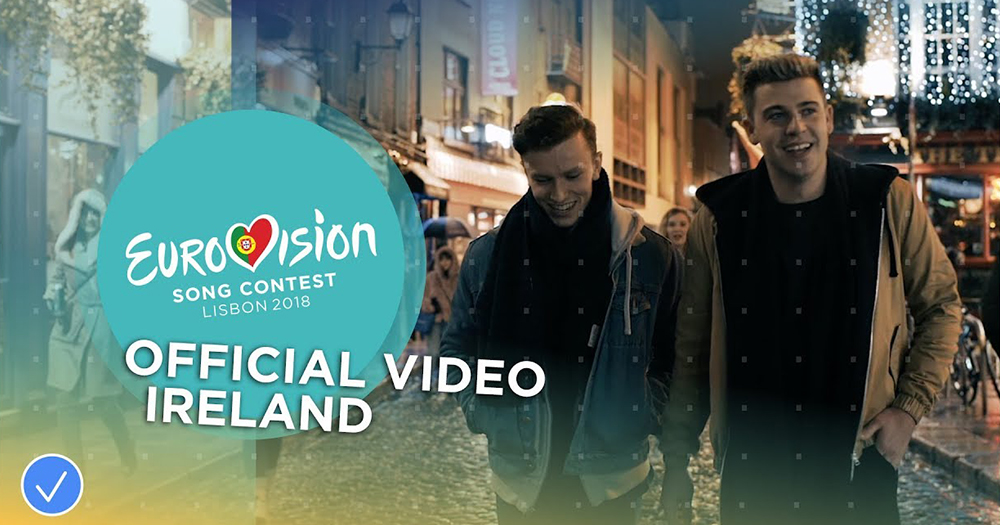Ireland’s Eurovision entry could face a broadcast ban in Russia. The video features a gay couple dancing together in Temple Bar.
There has been speculation that the video violates Russia’s strict anti-gay “propaganda” ban.
Eurovision hopeful Ryan O’Shaughnessy will represent Ireland at the song contest in Lisbon this May with the ballad, which was co-written with Mark Caplice and Laura Elizabeth Hughes.
It is not yet known if the live Eurovision stage performance will feature a gay couple. Countries are not obliged to broadcast promotional videos for entries, just the live performances.
On reading the news last night of a possible ban, Ryan tweeted: “The Russians are now threatening a broadcasting ban because of my video for ‘Together’. Anti-gay propaganda regime at its finest! Hilarious if you ask me.. #IDareYou”
The Russians are now threatening a broadcasting ban because of my video for ‘Together’. Anti-gay propaganda regime at its finest! Hilarious if you ask me.. #IDareYou https://t.co/6j1ECrdLBi
— Ryan O'Shaughnessy (@Ryan_Acoustic) March 12, 2018
Speaking about the video, which sees a young couple strolling through the streets of Temple Bar, O’Shaughnessy said: “It was amazing seeing the video come to life in the way it did, sticking with the original concept that love is universal and there are testing moments in every relationship.”
On the process of penning the song, Ryan said “‘Together’ is a song that could only have been written with 2 of my favourite humans Mark Caplice & Laura Elizabeth Hughes. It began when I was having a coffee in Butlers on South William St, and penned the opening lyric before heading to The Nucleas for the writing session! It’s so incredible to be a songwriter and watch a song unfold before your eyes. In my opinion, it’s one of the greatest experiences life has to offer.
“And a big thanks to Kevin O’Dwyer and Alan McGrath these guys are A1 performers, super Irish talents. They helped to show that love is universal, not gender specific and no matter the relationship there is no high without a low! I’m more than proud to be representing the motherland this year and I’m positive we’ll be bringing it home!”

Eurovision Voting Illustrates Changing European Relationships
Voting patterns in the Eurovision Song Contest is the topic of a key presentation at Maynooth University’s Eurovision Unplugged conference.
Since the inaugural competition in 1956, the Eurovision Song Contest has been a bastion of European pop culture, as well as a flashpoint for debate over relationships between different European countries, and even as to what makes a country European.
One of its more contentious aspects is its system of voting. In the past, Eurovision has had voting systems that were 100% based on jury voting and then 100% based on televotes (votes from the public).
In the latest model (used since 2016) each country now awards separate sets of jury points and televote points.
While the voting system has seen changes, there has been a consistent stereotype that blocs of countries repeatedly vote for each other out of solidarity and friendship, rather than based on the quality of entries themselves.
This will be explored in detail by Maynooth University’s resident Eurovision expert and lecturer in Geography Dr Adrian Kavanagh, as he presents Uncovering Eurovision’s Voting Patterns with Caoilfhionn D’Arcy (Maynooth University) and some members of his Geography of Eurovision class.
The presentation is part of Maynooth University’s one-day #Eurovision Unplugged conference, which takes place on Wednesday, 14th March 2018. The theme of the day is The Eurovision Song Contest – The Geography, The History, The Votes and The Songs.
Dr Kavanagh says, “We see that voting patterns for the Eurovision Song Contest were relatively consistent from 1998 onwards when televoting was brought in and a number of Eastern European countries were taking part.
“Successful, or at least relatively successful countries in Eurovision have generally benefitted from the following; having supportive friends and neighbours – most notably in the case of the Former Yugoslav and ex-Soviet states – or by having a strong diaspora across Europe, such as Turkey, Armenia and Romania.”
#EurovisionUnplugged takes place on Wednesday, 14th March from 11:00 am to 3:30 pm, in Room 11, School of Education, Maynooth University (North Campus).
The Eurovision Song Contest 2018 takes place from 8th May 2018 in Lisbon, Portugal, with singer-songwriter Ryan O’Shaughnessy set to represent Ireland in Semi Final 1 with his song Together.
Watch the video for Ireland’s Eurovision 2018 entry:
© 2018 GCN (Gay Community News). All rights reserved.

comments. Please sign in to comment.